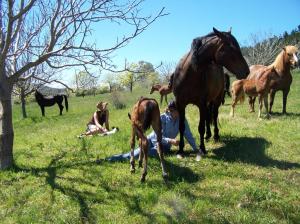By Judy Oldmeadow, Owner & Master Horsewoman, Samaria Creek Morgan Horses
An old breeder once told me, ‘I’ve been to places with one or two quiet horses, but never one where the whole herd is quiet and friendly!’
We have over 40 horses. And when a new one arrives with insecure behaviour, it becomes calm and tractable in a very short time – sometimes only days.
Owners visiting their horses after several months often don’t recognise them and make comments like, ‘She’s standing taller’, He’s moving more smoothly’ and recently of an older brood mare, ‘She looks proud and happy’.
I used to attribute this to my training methods. As I’ve matured, however, I’ve noticed how much our living environment, natural pasture and wonderful water contribute to calm, peaceful horses with sound feet, bones and joints.
Magnesium is often called the ‘nerve mineral’. It regulates nerve fibres, controls the central nervous system and helps with muscle and glandular function.
Horses deficient in this element can show nervousness, wariness, excitability and muscle tremors. This gives magnesium its reputation for having a calming influence on equines.
Horses have a limited ability to store magnesium. Problems arising from deficiency usually manifest quickly.
Magnesium deficiency is becoming widespread in Australia. It’s more readily inhibited than calcium by artificial fertilisers. It’s also made inert in the body by the sodium fluoride in some water supplies.
A study of magnesium uptake in horses was conducted by six veterinarians at the Department of Veterinary Biosciences, College of Veterinary Medicine, at Ohio State University.
It found the magnesium requirement of a typical horse was at 13 mg / kg of body weight per day. Horses growing, lactating or working use more (a lot of magnesium can be lost in sweat).
Opinions vary widely on magnesium supplements. It naturally depends in part on whether the soils on which a horse is grazing are deficient in the element. Such deficiency will be reflected in the grass grown.
In general, a horse gets 60-100% of its daily magnesium needs through a normal forage diet.
Deficiencies are most likely in spring (during periods of strong grass growth) and winter on pastures in milder areas (where grass is being pushed along with fertiliser).
Grass in both circumstances is likely to be low in magnesium, sodium and soluble carbohydrates, and high in nitrogen and potassium.
This is a double whammy: high potassium levels can slow the absorption of what little magnesium there is, while sodium (low in these situations) helps uptake.
Mechanisms affecting magnesium uptake in a horse are complex and not always diet related. Deficiency may just as likely be due to too much dietary potassium inhibiting uptake.
Nor is potassium the only potential player in this tricky equation. The presence and proportions of dietary calcium, phosphorous and fats also impact a horse’s ability to use the magnesium in its diet.
A deficient horse is likely to have a poor tolerance for work. Its muscles tie up quite quickly.
Magnesium even plays an important part in reducing equine obesity, and can lessen the risk of laminitis in animals prone to it during periods of strong spring grass growth.
Next time you’re looking for someone to care for your horse, make sure magnesium is on your list of ‘tough questions’.
Click here for a copy of our water report, which includes magnesium.

